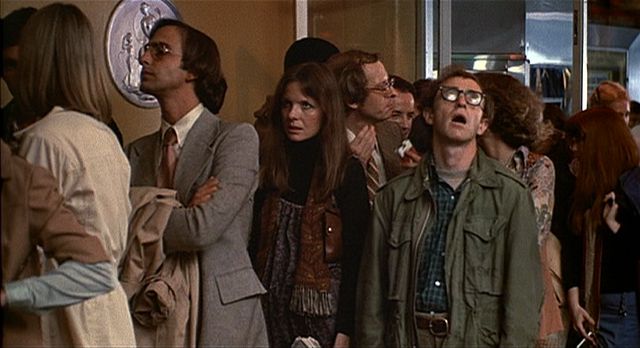Annie Hall (1977) 
“A nervous romance.”

Director: Woody Allen
Cast: Woody Allen, Diane Keaton, Tony Roberts
Synopsis: Neurotic New York comedian Alvy Singer falls in love with the ditsy Annie Hall.
There can be few screen performers who divide opinion as strongly as Woody Allen. People seem to either love him or hate him. Personally, his brand of quirky, neurotic humour has never done a lot for me, but having watched Annie Hall for the first time in years I have to admit that it looks a lot better today than it did way back when. He plays Alvy Singer here, a comedy writer who, in an opening monologue delivered direct to the camera, states that his relationships with women can be summed up by the old Groucho Marx joke, ‘I would never want to belong to any club that would have someone like me for a member.’ He then proceeds to show us one relationship which illustrates with typical Allen-esque wit and insight how this philosophy influences his life.
Singer meets Annie Hall (Diane Keaton) when they make up a pair for a tennis match arranged by his friend Rob (Tony Roberts), a lady-killing actor based in Los Angeles who follows an emotionally empty — but sexually satisfying – lifestyle that is the complete antithesis of Alvy’s life and aspirations. The movie traces the course of Alvy and Annie’s relationship from that point, with its tenuous beginnings during which their conversation is subtitled with the actual thoughts of the speaker. Allen breaks the reality barrier like this a lot in Annie Hall. Occasionally, he halts the story to question passers-by on the street about what they would do in his position. It doesn’t seem too out of the ordinary today, but back then it was a ground-breaking departure from conventional moviemaking, and a key example of the inventiveness Allen could bring to his work earlier in his career. Alvy’s relationship with Annie progresses naturally to the stage where she moves into his apartment, and already Alvy’s fear of commitment starts to become apparent. He also launches a relentless campaign to ‘educate’ Annie in the cultural and intellectual subjects that interest him. That would be enough to put off most women, but Annie hangs in there until eventually the relative positions within the relationship are more or less turned completely around.
It probably isn’t difficult for members of both the pro- and anti-Woody camps to understand why the other feels the way they do. Allen does have a knack for the acerbic one-liner and his apparently constant self-analysis inevitably results in some intelligent insight into people and relationships, but that same self-analysis can easily be construed as a kind of self-indulgent navel-gazing that is of interest to only the most devoted Woody fan.
Released in 1977, Annie Hall saw off Star Wars to win that year’s Best Picture Academy Award. By 2013 it remained the last comedy to have won that accolade, which says both a lot about its quality and about the declining standard of comedies since. Perhaps that is what makes the movie seem more agreeable now than it did when first viewed. Allen’s film credits its audience with a level of intelligence that Hollywood refuses to believe its present audiences are capable of possessing (and judging by the popularity of reality TV and soaps, Hollywood may well be right). With a few notable exceptions, the comedy is verbal, not physical and, ironically, its assumption of knowledge of American cultural mores of the time probably means that many of its jokes will no longer be accessible to a younger audience. Equally ironically, the popularity of Allen’s movies seems to have declined the more generic they have become.
(Reviewed 5th August 2012)
httpv://www.youtube.com/watch?v=TBzHphcc2Jw
